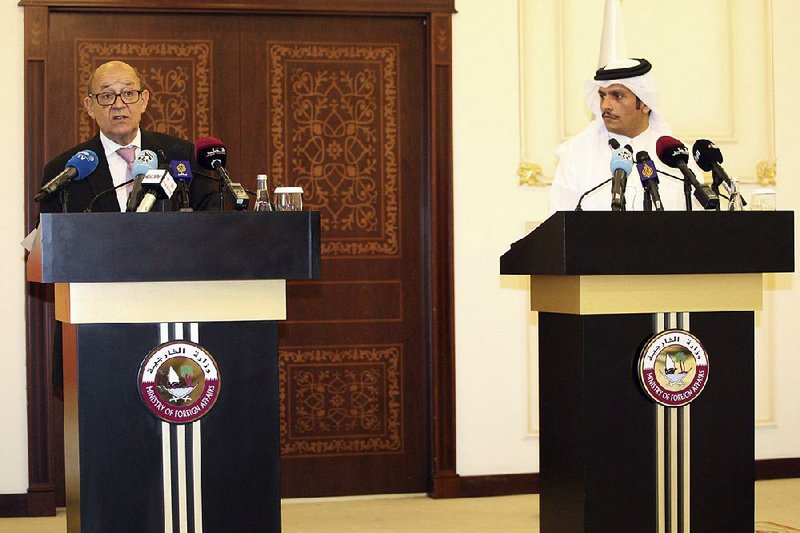DOHA, Qatar -- France's foreign minister on Saturday called on Qatar's neighbors to immediately lift measures affecting thousands of people in the Persian Gulf, becoming the latest foreign diplomat to visit the region and attempt to find a resolution to a dispute that has dragged on for more than a month.
In early June, Saudi Arabia, the United Arab Emirates, Bahrain and Egypt cut ties with Qatar and moved to isolate the Gulf nation, canceling air routes between their capitals and Qatar's and closing their airspace to Qatari flights. Saudi Arabia also sealed Qatar's only land border, affecting a key source of food imports in the mostly desert nation.
The four countries expelled all Qatari nationals, affecting mixed-nationality families in the Gulf, among others. Before the dispute, Qataris could travel visa-free between the Gulf countries.
French Foreign Minister Jean-Yves Le Drian said such punitive measures should end.
"France is calling for these measures to be lifted, especially ones that affect the [Qatari] population, specifically measures that impact bi-national families that have been separated," Le Drian said.
He spoke in Qatar alongside Qatari Foreign Minister Sheikh Mohammed bin Abdulrahman Al Thani, who said he welcomed mediation efforts and possible negotiations as long as they are based on respect for "sovereignty."
After his visit to Qatar, Le Drian headed to Saudi Arabia, where he met with Crown Prince Mohammed bin Salman. In remarks to reporters Saturday evening, Le Drian said France seeks to play a supportive role in the mediation efforts.
The Arab quartet has demanded that Qatar end its support of extremist groups, but also its support of Islamist political dissidents they brand as terrorists but whom many Western allies do not. Other demands include shutting down Qatar's Al-Jazeera network, curbing ties with Iran and expelling Turkish troops stationed in Qatar.
Qatar has rejected the demands, saying the list in its entirety infringes on national sovereignty. Qatar also rejects allegations it has supported terror groups.
Despite the blockade by the four Arab countries, life has not been affected significantly inside Qatar. The government has stepped in to help pay additional costs of shipping and has looked to its allies, including Turkey, for food imports.
With Qatar holding firm to its position, a top UAE diplomat cautioned that the diplomatic standoff could be prolonged.
"We are heading toward a long estrangement," UAE Minister of State for Foreign Relations Anwar al-Gargash wrote on Twitter.
"The reality is we are far from a political solution that changes Qatar's course. In light of that, nothing will change and we must look to a different mode in relations," he added.
Earlier last week, U.S. Secretary of State Rex Tillerson visited the Gulf, meeting separately with officials in Qatar, Saudi Arabia and Kuwait, which is trying to mediate the dispute. In Qatar, he secured an agreement to enhance cooperation on combating terrorism and terror financing.
Saudi commentators criticized the result of Tillerson's visit to Qatar, saying the signed counterterrorism agreement fell far short of the demands made for Qatar to change its policy of supporting Islamists. Tillerson, however, said the discussions had been "helpful" and that the U.S. planned to continue its attempts to mediate an end to the dispute.
Qatar hosts al-Udeid Air Base, the largest U.S. military installation in the Middle East and a hub for U.S.-led operations against the Islamic State militant group in Iraq and Syria.
Saudi Arabia, the UAE and Qatar are among the world's biggest military spenders, purchasing billions of dollars in equipment from the U.S. and Europe to beef up their militaries. All three are considered allies of many Western nations.
A Section on 07/16/2017
